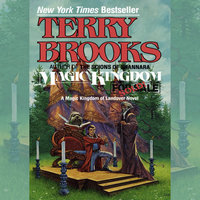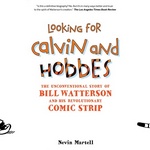 Magic Kingdom for Sale–Sold!
Magic Kingdom for Sale–Sold!
by Terry Brooks, Jeremy Arthur (Narrator)
DETAILS: Series: Landover, #1 Publisher: Random House Audio Publication Date: March 28, 2022 Format: Unabridged Audiobook Length: 12 hrs., 48 min. Read Date: May 19-24, 2022

What’s Magic Kingdom for Sale–Sold! About?
Ben Holiday is a recently widowed trial lawyer from Chicago. His wife’s death has left him devastated, he is essentially going through the motions in all aspects of his life. One wintery day, his mail includes a holiday catalog addressed to his wife (younger readers should consult their parents about mail-order catalogs). She loved those kind of things, so Ben flips through it as a way to connect with her. One listing catches his eye—an offer to purchase a magic kingdom, with all that is implied by that.
He can’t get the idea out of his mind, eventually flying to New York to meet with the representative for the company about the offer. It’s sincere, he’s told, for one-million dollars (largely refundable within a brief period of time), he can buy a kingdom—becoming its king, with all the benefits that come with that.
He’s so desperate to change his life that Ben gambles on it. Takes a leave of absence from his practice, liquidates 1/3 of his investments, and buys it.
He’s astounded to find out that the advertisement was true—it’s another world, he gets there magically and the world is full of magic. He has a wizard advisor, a scribe who’s a talking dog (okay, technically a man accidentally turned into a dog), a magic castle, and a pair of kobolds as servants.
Sadly, it’s been so long since a legitimate king sat on the throne that the Kingdom’s magic is dying. The magic is weakening, and the people, plants, and animals are suffering. If something doesn’t stop it, Landover will cease to exist.
Does Ben Holiday have the ability, conviction, and grit to restore Landover to its former glory?
Ben’s Emotional State
One of the best things about this book is the depiction of Ben’s clinical depression. It’s never described in those terms, but it was clearly shown. His desperation at finding a way out of this life—and then his second thoughts, once he saw how real (and un-fairy tale-like) Landover was, also rang true.
I’m not quite as convinced that Brooks’ depiction of his resolve to stay and fix things—or the reasoning behind it—was quite as successful. It was clear, but it was a bit more telling than showing.
I’m willing to bet that when I read this back in the 80s/90s, I didn’t appreciate this aspect as much as I should’ve, but I sure do now.
How Was the Narration?
This was a much different book than the other time I listened to Jeremy Arthur (Looking for Calvin and Hobbes), so I wasn’t sure what to expect. I would’ve hoped for a little more “life” to it—I wanted him to bring out the personalities just a little more. I’m not saying he did a bad job, at all, he could’ve brought a little more “oomph” to it, is all.
I do wonder if a little of that impression should be directed at the text and not Arthur. That’s absolutely possible, maybe even likely.
I do see that the previous version of the audiobook was recorded by Dick Hill. Nothing against Hill, but man, I’m glad I got this version—I just don’t see how he was the right guy for the job. Then again, I’d have said the same thing about Dave Barry books, and he surprised me with Best. State. Ever., so what do I know?
I guess what I’m saying is that Arthur did a fine job—I’m not over the moon, but I’m not complaining. I don’t think I did a great job of conveying that.
So, what did I think about Magic Kingdom for Sale–Sold!?
I don’t remember exactly the first time I read this book—it was published in 1987, and it’s entirely possible I read it that year. If not, it was soon after that. I loved it and read it several times in the following years. I wasn’t sure how it’d hold up after all this time, but I had hope that it’d be okay.
It largely was. As is so often the case, the memory was better than the reality. Nostalgia a tricky thing.
Some of the language—especially in dialogue—was a bit stiff and stuffy. I kept thinking, this is a story about a guy who buys a magic kingdom, it should be a little more fun. Holiday didn’t have quite the sense of wonder about Landover that I wanted—he had some, but he was a bit too serious about everything. He wasn’t quite like Eustace Scrubb pre-dragon cave, but he sure wasn’t like the Pevensies, either.
I love the concept, I think all the characters are exactly what you want in this kind of story, and the worldbuilding was spot-on—all the ingredients are there, I just didn’t love the execution. It was an entertaining read and did everything right—it just felt reserved. If this was first published today, the drama would’ve been starker, the joy/wonder would’ve been turned up and it’d have been more amusing overall.
Basically, I probably should’ve left good memories stay that way.
I remember thinking the first sequel was okay but the next one really disappointed me, and I didn’t continue with the series. I went into this thinking I probably wouldn’t continue—and I likely won’t. If only to keep what luster is still attached to my memories.

This post contains an affiliate link. If you purchase from it, I will get a small commission at no additional cost to you. As always, any opinions expressed are my own.
![]()




 Nevin Martell, like just about everyone who ever read him, is a Calvin and Hobbes fan — what’s more, he discovered the strip at the right age and was able to appreciate it as only a child can — without being self-conscious about reading a comic strip and with devotion. Years later, when trying to write something more meaningful to him than another book about a pop star, he decides to write about that strip and its reclusive creator.
Nevin Martell, like just about everyone who ever read him, is a Calvin and Hobbes fan — what’s more, he discovered the strip at the right age and was able to appreciate it as only a child can — without being self-conscious about reading a comic strip and with devotion. Years later, when trying to write something more meaningful to him than another book about a pop star, he decides to write about that strip and its reclusive creator.
